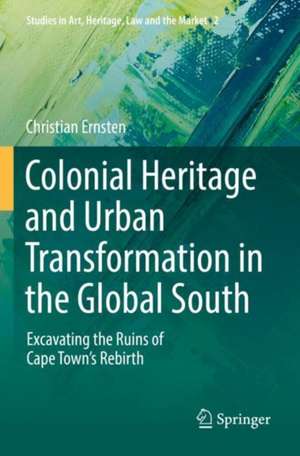Colonial Heritage and Urban Transformation in the Global South: Excavating the Ruins of Cape Town's Rebirth: Studies in Art, Heritage, Law and the Market, cartea 2
Autor Christian Ernstenen Limba Engleză Paperback – 29 oct 2022
This book traces and analyses the role of heritage in the urban transformation of the city of Cape Town. By looking at discourses of heritage and urban design, the book shows how Cape Town positions itself as an emerging global city in the context of a series of global events. The book points at how a heritage focus on the themes of post-colonial and post-apartheid reconciliation, restitution and memory in the city shifts to a focus on creativity, design and the arts. Thereby showing how traumatic remnants of colonialism and apartheid are reframed as “design challenges”. Furthermore, it argues that the idea of a transformed society is projected into a future time and the chaotic present everyday life is left to its own devices. Against this backdrop, the book lays out the opportunities for epistemological reset and decolonial reflection on the city’s deep histories, its embedded injustices and traumas that surfaced.
| Toate formatele și edițiile | Preț | Express |
|---|---|---|
| Paperback (1) | 721.95 lei 6-8 săpt. | |
| Springer International Publishing – 29 oct 2022 | 721.95 lei 6-8 săpt. | |
| Hardback (1) | 727.97 lei 3-5 săpt. | |
| Springer International Publishing – 28 oct 2021 | 727.97 lei 3-5 săpt. |
Preț: 721.95 lei
Preț vechi: 880.43 lei
-18% Nou
Puncte Express: 1083
Preț estimativ în valută:
138.14€ • 144.62$ • 114.31£
138.14€ • 144.62$ • 114.31£
Carte tipărită la comandă
Livrare economică 07-21 aprilie
Preluare comenzi: 021 569.72.76
Specificații
ISBN-13: 9783030858087
ISBN-10: 3030858081
Pagini: 175
Ilustrații: XIX, 175 p. 45 illus., 37 illus. in color.
Dimensiuni: 155 x 235 mm
Greutate: 0.28 kg
Ediția:1st ed. 2021
Editura: Springer International Publishing
Colecția Springer
Seria Studies in Art, Heritage, Law and the Market
Locul publicării:Cham, Switzerland
ISBN-10: 3030858081
Pagini: 175
Ilustrații: XIX, 175 p. 45 illus., 37 illus. in color.
Dimensiuni: 155 x 235 mm
Greutate: 0.28 kg
Ediția:1st ed. 2021
Editura: Springer International Publishing
Colecția Springer
Seria Studies in Art, Heritage, Law and the Market
Locul publicării:Cham, Switzerland
Cuprins
1. Introduction.- 2. Walking Back Urban History.- 3. Engineering an Urban Renaissance.- 4. Resurfacing Colonial Dead.- 5. Contesting Apartheit Ruins.- 6. Scripting Utopias and Dystopias.- 7. Reimagining Urban Truth.- 8. Conclusions.
Notă biografică
Christian Ernsten is assistant professor of heritage studies at Maastricht University's Department of History. He is affiliated with the Maastricht Centre for Arts and Culture, Conservation and Heritage (MACCH).
Christian holds a PhD in African studies from the University of Cape Town in South Africa and has completed visiting research fellowships at the Conservation Department of the University of Gothenburg and at Aarhus University's Centre for Uses of the Past.
Christian holds a PhD in African studies from the University of Cape Town in South Africa and has completed visiting research fellowships at the Conservation Department of the University of Gothenburg and at Aarhus University's Centre for Uses of the Past.
Textul de pe ultima copertă
This book traces and analyses the role of heritage in the urban transformation of the city of Cape Town. By looking at discourses of heritage and urban design, the book shows how Cape Town positions itself as an emerging global city in the context of a series of global events. The book points at how a heritage focus on the themes of post-colonial and post-apartheid reconciliation, restitution and memory in the city shifts to a focus on creativity, design and the arts. Thereby showing how traumatic remnants of colonialism and apartheid are reframed as “design challenges”. Furthermore, it argues that the idea of a transformed society is projected into a future time and the chaotic present everyday life is left to its own devices. Against this backdrop, the book lays out the opportunities for epistemological reset and decolonial reflection on the city’s deep histories, its embedded injustices and traumas that surfaced.
Caracteristici
Functions as a case for understanding the role of heritage in urban transformation of cities in the global south Deconstructs the meaning of urban renaissance processes in the context of a postcolonial city Lays out the value of the conceptual idea of the revenant in the context of a postcolonial heritage landscape








